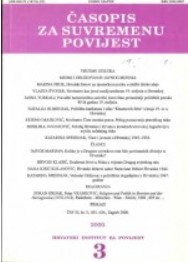VEĆESLAV HOLJEVAC U POLITIČKIM DOGAĐAJIMA U HRVATSKOJ 1967. GODINE
VEĆESLAV HOLJEVAC IN POLITICAL EVENTS IN CROATIA IN 1967
Author(s): Katarina SpehnjakSubject(s): Political history, Government/Political systems, Political behavior, Post-War period (1950 - 1989)
Published by: Hrvatski institut za povijest
Keywords: Većeslav Holjevac; Political events in Croatia in 1967; subject to political criticism; Božidar Adžija;
Summary/Abstract: The dismissal of V. Holjevac from the political life of Croatia, confirmed by his resignation of the membership in the Central Committee of the Association of Communists of Croatia at the end of 1967 had not been a subject of historiographical research. The article analyses, on the basis of original Party documents from that period, the circumstances of this event. Already in spring 1966, Holjevac was subject to political criticism as president of the Committee of the Fund for nominating the Scientific Awards "Božidar Adžija". At that time two philosophers, members of the Praxis Circle (which had been for several years subjected to Party condemnations), were also given the award. Contrary to political pressures and public criticism, Holjevac persisted in defending those awards. ln the political campaign of the Party forums after the appearance of the "Declaration on the name and position of the Croatian language" in March 1967 the Matica iseljenika Hrvatske, whose president was Holjevac, had been recognized as one of the "focal points of nationalism". The Party Commission that had undertaken a considerable investigation in this institution attached to Holjevac a "nationalistic deviation" and responsibility for nationalistic manifestations in the Association (visible in the "Croatization" of the term "our emigration" (naše iseljeništvo), singing of "nationalistic" songs, national ''counting" and generally a lack of alert towards "nationalistic" events and, especially, an inadequate reaction regarding the "Declaration''), as well as his relationship towards particular Croatian emigrant organizations in America (qualification of the Croatian Academy of America and American-Croatian Academic Club as neutral and politically undecided" was contrary to the political marking of that time about them as "hostile" organizations).
Journal: Časopis za suvremenu povijest
- Issue Year: 32/2000
- Issue No: 3
- Page Range: 567-594
- Page Count: 28
- Language: Croatian

